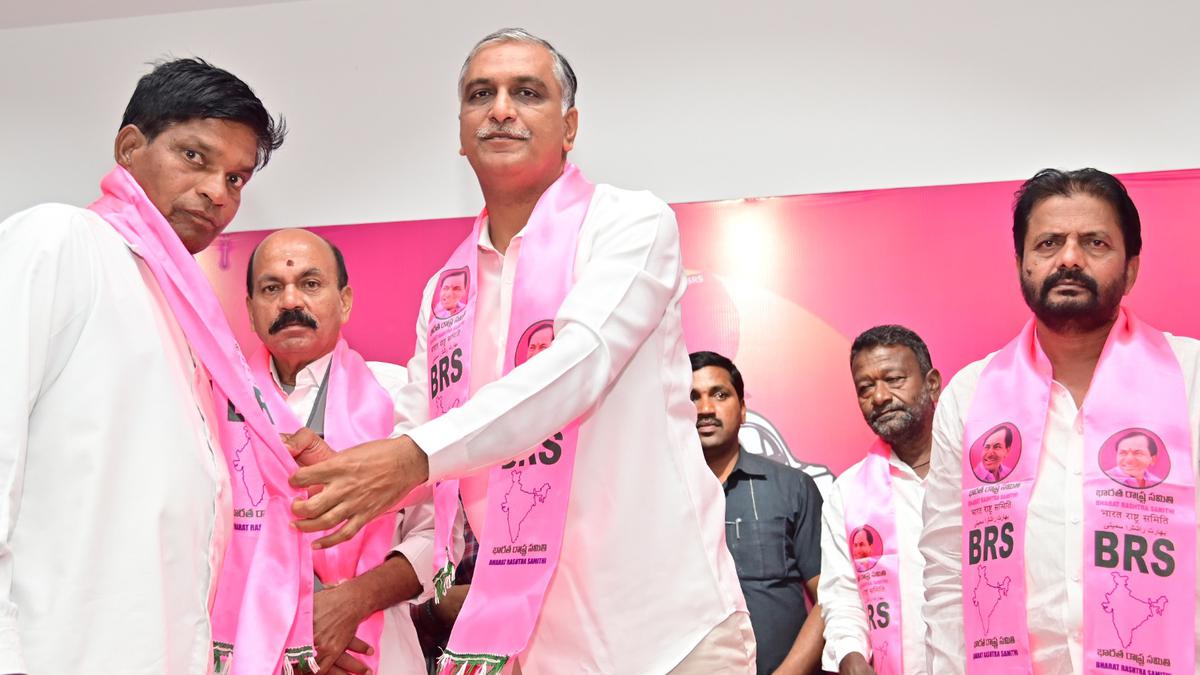
Revanth proves he is a true successor of Naidu on farm power issue: Harish Rao
The Hindu
Revanth proves he is a true successor of Naidu on farm power issue: Harish Rao
Bharat Rashtra Samithi (BRS) leader and Minister for Finance and Health T. Harish Rao has observed that Telangana Pradesh Congress Committee (TPCC) president A. Revanth Reddy is proving himself to be the true successor of former Chief Minister of Andhra Pradesh N. Chandrababu Naidu, who in the past had said that “practising agriculture is a waste exercise”.
Speaking at a meeting held at Telangana Bhavan here on Sunday, where Congress leaders and others from Zaheerabad constituency joined the BRS, Mr. Rao said while Mr. Naidu said agriculture was an unfruitful exercise, Mr. Revanth Reddy was of the view that only three-hour free power was enough based on the logic that a majority of farmers in Telangana were with land-holding upto 3 acres.
He sought to know how could Mr. Revanth Reddy change his word on power supply position in Telangana during the Congress regime in combined AP, when he was with TDP, as it was he who said that there was no supply even to take bath at borewells after attending funerals. He pointed out that bursting of transformers and burning of motors were a regular feature during the previous Congress regime.
Citing an example of power supply position during the previous Congress regime, Mr. Harish Rao said during a visit of legislators to the then Energy Minister Ponnala Lakshmaiah’s native village Kilasapur in Jangaon district, farmers there had complained about withering of crops as they were not getting even 3-hour supply. Now, even 6-7 hour supply was also not being given in Congress-ruled States such as Karnataka, Rajasthan and Chhattisgarh, he stated.
Further, it was also a regular practice for Congress and TDP to come to Assembly with empty pitchers and withered crops to highlight the issues of problems in power supply whenever they were in the opposition, but such scenes were not repeated during the last nine years of BRS governance. He said debate on power supply would be beneficial only to BRS and counter productive to Congress, as wide as it goes on.
He recollected that it was the Congress that had merged Telangana with Andhra and in the 1969 phase of statehood movement about 369 activists were killed by the then Congress Government. In 2004, the Congress had promised give statehood to Telangana if it was voted to power but went back after the win and diverted the rightful share of Krishna water to non-basin areas by expanding Pothireddypadu illegally.

“Writing, in general, is a very solitary process,” says Yauvanika Chopra, Associate Director at The New India Foundation (NIF), which, earlier this year, announced the 12th edition of its NIF Book Fellowships for research and scholarship about Indian history after Independence. While authors, in general, are built for it, it can still get very lonely, says Chopra, pointing out that the fellowship’s community support is as valuable as the monetary benefits it offers. “There is a solid community of NIF fellows, trustees, language experts, jury members, all of whom are incredibly competent,” she says. “They really help make authors feel supported from manuscript to publication, so you never feel like you’re struggling through isolation.”

Several principals of government and private schools in Delhi on Tuesday said the Directorate of Education (DoE) circular from a day earlier, directing schools to conduct classes in ‘hybrid’ mode, had caused confusion regarding day-to-day operations as they did not know how many students would return to school from Wednesday and how would teachers instruct in two modes — online and in person — at once. The DoE circular on Monday had also stated that the option to “exercise online mode of education, wherever available, shall vest with the students and their guardians”. Several schoolteachers also expressed confusion regarding the DoE order. A government schoolteacher said he was unsure of how to cope with the resumption of physical classes, given that the order directing government offices to ensure that 50% of the employees work from home is still in place. On Monday, the Commission for Air Quality Management in the National Capital Region and Adjoining Areas (CAQM) had, on the orders of the Supreme Court, directed schools in Delhi-NCR to shift classes to the hybrid mode, following which the DoE had issued the circular. The court had urged the Centre’s pollution watchdog to consider restarting physical classes due to many students missing out on the mid-day meals and lacking the necessary means to attend classes online. The CAQM had, on November 20, asked schools in Delhi-NCR to shift to the online mode of teaching.









